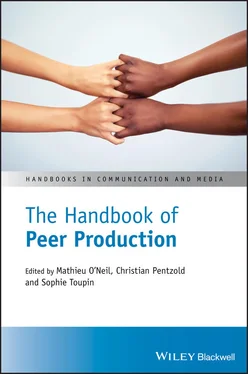28 Harvey, D. (2010). A companion to Marx’s capital. New York, NY: Verso.
29 Hitlin, P., & Rainie, L. (2019, January 16). Facebook algorithms and personal data. Pew Research Center. Retrieved from www.pewinternet.org/2019/01/16/facebook‐algorithms‐and‐personal‐data/
30 Huws, U. (2014). Labor in the global digital economy: The cyberteriat comes of age. New York, NY: Monthly Review Press.
31 Jarrett, K. (2016). Feminism, labour and digital media: The digital housewife. New York, NY: Routledge.
32 Lazzarato, M. (1996). Immaterial labor. In P. Virno and M. Hardt (Eds.), Radical thought in Italy: A Potential Politics (pp. 133–150). Minneapolis, MN: University of Minnesota Press.
33 Levy, S. (2010). Hackers: Heroes of the computer revolution. Sebastopol, CA: O’Reilly Media.
34 Linebaugh, P. (2008). The magna carta manifesto. Berkeley, CA: University of California Press.
35 Marx, K. (1906). Capital: A critique of political economy, Vol. 1. New York, NY: Modern Library.
36 Mason, P. (2015). Postcapitalism: A guide to our future. New York, NY: Farrar, Straus and Giroux.
37 McGuigan, L., & Manzerolle, V. (Eds.) (2013). The audience commodity in the digital age: Revisiting a critical theory of commercial media. New York, NY: Peter Lang.
38 McRobbie, A. (2016). Be creative: Making a living in the new culture industries. Cambridge: Polity.
39 O’Mahony, S., & Bechky, B. A. (2008). Boundary organizations: Enabling collaboration among unexpected allies. Administrative Science Quarterly, 53(3), 422–459.
40 O’Reilly, T. (2005, September 30). What is web 2.0. O’Reilly.com. Retrieved from www.oreilly.com/pub/a/web2/archive/what‐is‐web‐20.html
41 Prashad, V. (2007). The darker nations: A people’s history of the third world. New York, NY: The New Press.
42 Ryan, A. B. (2013). The transformative capacity of the commons and commoning. Irish Journal of Sociology, 21(2), 90–102.
43 Santos, C., Kuk, G., Kon, F., & Pearson, J. (2013). The attraction of contributors in free and open source software projects. Journal of Strategic Information Systems, 22(1), 26–45.
44 Schiller, D. (1999). Digital capitalism: Networking the global market system. Cambridge, MA: MIT Press.
45 Schiller, D. (2014). Digital depression: Information technology and economic crisis. Urbana, IL: University of Illinois Press.
46 Scholz, T. (Ed.). (2013). Digital labor: The Internet as playground and factory. New York, NY: Routledge.
47 Scholz, T. (2014, December 5). Platform cooperativism vs. the sharing economy. Medium. Retrieved from https://medium.com/@trebors/platform‐cooperativism‐vs‐the‐sharing‐economy‐2ea737f1b5ad
48 Singh, N. (2017). Becoming a commoner: The commons as sites for affective socio‐nature encounters and co‐becomings. Ephemera: Theory & Politics in Organization, 17(4), 751–776.
49 Smythe, D. W. (1981). Dependency road: Communications, capitalism, consciousness, and Canada. Norwood, NJ: Ablex.
50 Srnicek, N., & Williams, A. (2016). Inventing the future: Postcapitalism and a world without work. New York, NY: Verso.
51 Terranova, T. (2004). Network culture: Politics for the information age. Ann Arbor, MI: Pluto.
52 The Linux Foundation. (2019). 2017 State of Linux Kernel Development. The Linux Foundation. Retrieved from www.linuxfoundation.org/2017‐linux‐kernel‐report‐landing‐page/
53 Turow, J. (2013). The daily you: How the new advertising industry is defining your identity and your worth. New Haven, CT: Yale University Press.
54 Ulick, J. (2000, April 3). Nasdaq sinks 350 points. CNN Money. Retrieved from https://money.cnn.com/2000/04/03/markets/markets_newyork/
55 United States v. Microsoft, 253 F.3d 34 (D.C. Cir. 2001).
56 Wang, A. X. (2019, February 6). Spotify turns a profit for the first time – and reveals its bigger ambitions. Rolling Stone. Retrieved from www.rollingstone.com/music/music‐news/spotify‐fourth‐quarter‐profit‐790725/
1 1This paragraph provides a basic summary of the argument made by Robert Brenner. For more information, see R. Brenner (2006). The Economics of Global Turbulence. London: Verso.
4 Social Norms and Rules in Peer Production
Christian Pentzold
The regulation of peer production projects is usually achieved by the users themselves. Ideally, this self‐organization and self‐management depend on shared social norms and rules. Some of these institutional arrangements characterize the larger population of peer production projects, whilst others are the attribute of particular projects. The chapter provides an overview and comparison of peer production’s institutions, traces their origins, and describes their implications for cooperation and governance.
Peer production is often advertised as a truly alternative form of providing information goods and services, one that is less constraining than hierarchical firms or contractual markets. Hence, voluntary participation and freely available outcomes are taken to epitomize a novel form of libertarian cooperation unfettered by rules and restrictions. This kind of ideal setting of “organizing without organizations,” as Clay Shirky (2008) described it, should be characterized by egalitarianism, communal evaluation, and flat, fluid, or even absent hierarchies so as to maximize individual freedom and autonomy (Bruns, 2008; Stevenson, this volume). Peer production does, therefore, not only rest on the freedom of membership and commons goods but is believed to also be freedom‐producing (Tkacz, 2015; see also Borschke, this volume; Dulong de Rosnay, this volume). It thus produces free information and services, but also ought to enhance the practice and experience of generosity, altruism, and comradery (Benkler & Nissenbaum, this volume; Firer‐Blaess & Fuchs, 2014).
Ideas of independence, voluntarism, and equality, deliberation and self‐amending procedures are deeply ingrained in the rhetoric and culture of peer production (Fish et al., 2011; Jemielniak, 2016; see also Bauwens & Kostakis, this volume; Dafermos, this volume). When considering the actual interactions in projects, these claims seem vastly exaggerated: Free and open source software initiatives like Debian have, for instance, devised extensive ranks and procedural schemes to steer contributors. In Wikipedia, editors complain about cliques and the power plays of an oligarchy of users and they struggle with bureaucracy and formalized rules.
Addressing this discrepancy, it would be too easy to just dismiss the discourse around the virtues of peer production as an ill‐founded pipedream that never was in touch with its reality. Instead of decrying the apparent gap between the rationale of peer production as an alternative mode of cooperation and its imperfect practical accomplishment, it is more productive to study the processes through which organizational forms and institutions come into being. That way, the consolidation of norms, codes of conduct, and contributor positions does not arise as an inadvertent setback but can be approached as an inevitable and even requisite development. On these terms, Kreiss, Finn, and Turner (2011) refer to Max Weber’s classical sociological thought in order to dismiss the idea that peer production must stand against bureaucracy. Indeed, bureaucracy can protect against arbitrary rule. Loose hierarchies or the absence of rules are, therefore, not per se more egalitarian or democratic because “regulations hold the whims of individual members in check,” Kreiss et al. (2011, p. 251) argue. The authority of rules and formalized workflows do not automatically preclude peer production or stifle creativity but are necessary to make it happen. Anarchy has, it seems, never been an option, even though the ordering of peer production projects must not necessarily take the shape of a formalized bureaucracy (O’Neil, 2014). In fact, a key characteristic of peer production institutions is that they are openly debated by participants on mailing lists in Debian or on wiki pages as in Wikipedia.
Читать дальше


![О Генри - Справочник Гименея [The Handbook of Hymen]](/books/407356/o-genri-spravochnik-gimeneya-the-handbook-of-hymen-thumb.webp)









